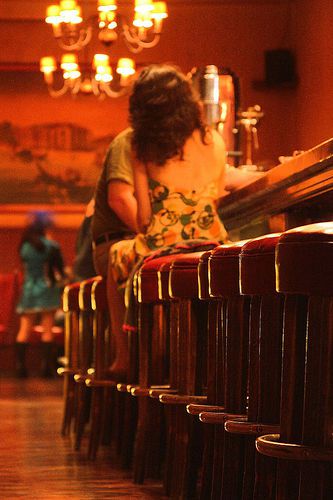
By Earl Lovelace
Brought to you by the Guernica/PEN Flash Series
It is Fall. A Saturday. Mid morning. I am in downtown Connecticut in a snack bar, having tea with a friend when in lurches this man, Black, wide-eyed, not untidy, hungover from years of carousing. He stops to get his bearings and looks around him with jerky, slow-motion movements, and I see the unsteadiness and suspicion: the clear questioning eyes, the swollen cherry-red wino-lips, the fugitive look of a man who had run away before, and had allowed himself to be captured and given a scrubbing and a set of clean still-rumpled secondhand clothes, and who had set out again this morning and had found himself in this place. Before he can steady himself, two men about the same height and build, wearing beige jackets and no ties, disconnect themselves from the décor and move toward him.
The place has that clean polished look and the scent of cedar oil. It is a relaxed place where you can carry on a conversation without raising your voice to be heard, a place with paintings and glass bowls and tea sets and flowers, fragile-looking things. The sensible thing for him to do is to stay still, which is what he tries to do, but he wants something from the snack bar. The waiter is not understanding what he is saying. To make himself understood, he begins to gesticulate. Every gesture he makes, his arms grow bigger and longer, and I am sure that in a little while he would start to knock over the fragile things. I am not the only one to notice this. The men in beige jackets now hurry toward him. They want him out. That is their first thought, Get this fella out of here. So they aren’t listening to what he’s trying to say. He himself stands in a dream of confusion. They indicate that they want him to leave. It isn’t so much that he doesn’t want to leave; he has hardly had time to arrive. Seeing the men approaching, he is frantic in his attempts to explain. He suspects he has done something wrong, but what it is, he doesn’t know. He pulls his long hands to his chest, hunching his shoulders as he appeals to the men in beige jackets. This defensiveness is not a posture he is happy with, and as the men in beige jackets press down on him, I get a glimpse of another side to him that is a flicker or two away, something stubborn and crazy and ugly. Something that doesn’t want to listen and doesn’t want to hear.
If he feels pushed, he will turn into a bull, a storm. If the world is not careful, he will lower his horns. I am not sure the men in the beige jackets understand this.
My friend with whom I am having tea looks to me patiently.
What does he want? she asks.
What does he want? I ask, loud enough for the men in the beige jackets to turn and look at me. And still seated, because I don’t want to alarm them, I say calmly, Give him what he wants. I’ll pay.
They look at me and recognize that that is a good way out. It is not the way they would have chosen but it is a good way. I’ll pay, I say. They back off. Their tone, however, is still firm, Waddoyou want?
It is clear that to the man, the question is confusing and strange. What do I want? he asks. He looks around as if he is trapped, breathing in deeply, looking at the men, saying nothing, because somehow he has no confidence in the answer. I look on as he labors over the problem then returns to the truth he was trying to improve upon.
I… I.
And he stands there bewildered, and then he says: I want some beans and rice.
The men in beige jackets stiffen into a new ease and certainty and helpfulness. We have no beans and rice.
Triumphant, and I can see from his eyes, from his look, I can see him trying to hold on to himself, trying to understand what has happened.
What do you want? I ask the man, less challengingly, hoping that my goodwill will inspire an alternative. I was still paying.
I just want some beans and rice, he said, keeping his hands close to his chest. On his face a look of disbelief, as if he never imagined it possible that anyone could misunderstand such a simple request.
Earl Lovelace was born in Toco, Trinidad, and has lived most of his life on the islands of Trinidad and Tobago. His books include While Gods Are Falling, winner of the BP Independence Award, the Caribbean classic, The Dragon Can’t Dance, and Salt, which won the 1997 Commonwealth Writers Prize. For Is Just a Movie, he has won the Grand Prize for Caribbean Literature by the Regional Council of Guadeloupe and the Bocas Literary Prize.
Nathalie Handal: Last Night in San Pedro de Macorís

